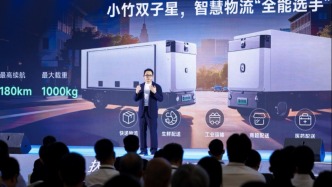
On September 15, Youjia Innovation, an intelligent driving company that has focused on pre-installed mass production solutions for the past ten years, officially launched its unmanned logistics brand "Xiaozhu Unmanned Vehicle".
Horizon Robotics founder and CEO Yu Kai, NavInfo CEO Cheng Peng, and RoboSense chairman and chief scientist Qiu Chunxin were on hand to witness the unveiling of Xiaozhu's first autonomous vehicle models, the T5 and T8. It's reported that Xiaozhu's next-generation autonomous vehicle will feature a highly integrated Horizon Robotics dual-range 6M chip, RoboSense's latest generation EMX lidar, and NavInfo's P-Box positioning system.
The first model, the T5, features optimized cargo space, freeing up 5.5m³ of volume, achieving a class-leading payload of 1,000kg and a maximum range of 180km. These specifications are designed specifically for niche scenarios such as express delivery, supermarket retail, and fresh food delivery.
The T8 has a volume of 8.5m³, a maximum load of 1,700kg, and a maximum range of 240km. It can be widely used in urban distribution and industrial logistics, and can also penetrate into more professional scenarios such as mining areas and ports.
The Xiaozhu autonomous vehicle utilizes a multi-sensor fusion solution, including three LiDAR sensors and 11 cameras, to achieve a 360-degree field of view with no blind spots. All cameras on the vehicle are equipped with a standard air-blowing self-cleaning function, automatically removing rain, snow, sand, and dust to prevent camera obstructions due to dirt.
The company revealed that the key intelligent driving components of Xiaozhu unmanned vehicle can be fully reused in Youjia's innovative pre-installed mass production project selection, sharing supply chain resources and maximizing the BOM cost of Xiaozhu unmanned vehicle.
Xiaozhu's unmanned vehicles have achieved a "launch and deliver" commercialization rhythm. Previously, Youjia Innovation had received recognition from Shenzhen Post and Eastern Public Transport, with the three parties signing a strategic cooperation agreement. At the press conference, the company announced the successful rollout of the first batch of unmanned vehicles and their official delivery to customers, including those in the express delivery industry. The initial rollout will begin in representative regional cities such as Shenzhen, Chengdu, Xi'an, and Jiangyin.
Competition in China's unmanned logistics sector is intensifying, with the entry of traditional Tier 1 players like Desay SV and rivals like Cainiao, which possess advanced scenario-based resources. It remains uncertain whether Youjia Innovation can leverage its accumulated technology, ecosystem synergy, and operational experience to secure a leading position in this emerging market. However, this incremental, scenario-driven approach to technology commercialization offers a valuable model for the Chinese autonomous driving industry.